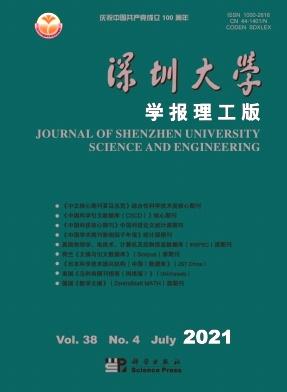Adaptive channel decoding method for polar codes
Q4 Engineering
Shenzhen Daxue Xuebao (Ligong Ban)/Journal of Shenzhen University Science and Engineering
Pub Date : 2022-09-01
DOI:10.3724/sp.j.1249.2022.05521
引用次数: 0
Abstract
Abstract: The polar code is a channel coding technology which can reach the Shannon limit in theory and has the advantage of low coding and decoding complexity. It is now one of the channel coding solutions in 5G communication. The successive cancellation list (SCL) decoding algorithm is the most commonly used decoding method for polar codes, but it has high memory and time complexity. Fast succesive cancellation (Fast-SC) decoding algorithm can effectively reduce the decoding complexity, but it has the problem of low reliability. In order to take into account the decoding efficiency and reliability of polar codes, a preFast-SCL decoding algorithm for adaptive channels is proposed. The algorithm combines the advantages of Fast-SC and SCL decoding algorithms. At the beginning of decoding, the Fast-SC algorithm is used to quickly obtain a group of decoding results and verify them. If the verification is passed, it will be outputed as the result, but if not, SCL decoding will be used to ensure the reliability. Simulation results show that the complexity of preFast-SCL decoding algorithm decreases gradually with the improvement of channel conditions. In additive white Gaussian noise channel, the reliability of preFast-SCL is basically the same as that of SCL decoding algorithm. When the signal to noise ratio (SNR) is 2. 0 dB, the decoding complexity of preFast-SCL is reduced by 45% compared with SCL, and the time performance gain is better under the condition of higher SNR.极化码的自适应信道解码方法
摘要:极性编码是一种理论上可以达到香农极限的信道编码技术,具有编码和解码复杂度低的优点。目前已成为5G通信中的信道编码解决方案之一。SCL译码算法是目前最常用的极化码译码方法,但它具有较高的存储复杂度和时间复杂度。快速连续对消(Fast- sc)译码算法可以有效降低译码复杂度,但存在可靠性低的问题。为了兼顾极化码的译码效率和可靠性,提出了一种适用于自适应信道的preFast-SCL译码算法。该算法结合了Fast-SC和SCL译码算法的优点。在解码开始时,使用Fast-SC算法快速获取一组解码结果并对其进行验证。如果验证通过,将作为结果输出,如果不通过,将使用SCL解码来确保可靠性。仿真结果表明,随着信道条件的改善,pre - fast - scl译码算法的复杂度逐渐降低。在加性高斯白噪声信道中,preFast-SCL的可靠性与SCL译码算法的可靠性基本一致。当信噪比为2时。在高信噪比条件下,preFast-SCL的解码复杂度比SCL降低45%,时间性能增益更好。
本文章由计算机程序翻译,如有差异,请以英文原文为准。
求助全文
约1分钟内获得全文
求助全文
来源期刊

Shenzhen Daxue Xuebao (Ligong Ban)/Journal of Shenzhen University Science and Engineering
Engineering-Engineering (miscellaneous)
CiteScore
0.90
自引率
0.00%
发文量
14
 求助内容:
求助内容: 应助结果提醒方式:
应助结果提醒方式:


